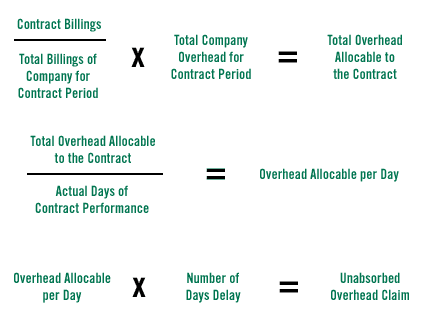Broad Eichleay Recovery Against ODOT May Be Limited
Kegler Brown Construction Newsletter May 1, 2002
A major Central Ohio highway contractor and Ohio's Department of Transportation ("ODOT") have actively litigated the applicability and legal parameters of the Eichleay formula - which is a generally accepted way to compute unreimbursed home office overhead in the event of compensable project delay or suspension. As a result, the applicability of the Eichleay formula to project delay in Ohio was confirmed and a public authority's exposure for these types of delay damages may have been broadened by a decision of the Court of Appeals. Complete General v. ODOT, Case No. 98AP-1619 (May 25, 2000, 10th District).
The Eichleay formula is generally calculated as follows:

The Franklin County Court of Appeals ruled that a contractor may establish a prima facie case for unabsorbed home office overhead when an "extension period" was added to the contract duration due to a government-caused delay during the original contract period and the contractor was on "standby" during the suspension period. The Court stated that it was only necessary for a part of the contractor's work to be on "standby," and not the entire project, for Eichleay to apply. The Court also said that the contractor's normal replacement of work during the bidding process should not constitute replacement work to bar an Eichleay recovery. Finally, the Court minimized the impact of the normal winter ODOT shutdown on the Contractor's recovery by stating that the Eichleay computation should be based upon the length of the extension period, rather than the suspension period. This appellate decision reinforced that Eichleay is alive and well here in Ohio and that this component of damages shall remain a considerable risk for public owners in the event of project suspensions and delays.
This case was appealed by ODOT to the Ohio Supreme Court where a decision was issued on January 16, 2002. The ruling of the Ohio Supreme Court on this important issue stated that an Eichleay formula was an acceptable way of determining unabsorbed home office overhead, but that owners should be given an opportunity to dispute particular items of cost. The Ohio Supreme Court refused to find that the Eichleay formula was the exclusive manner of determining unabsorbed home office overhead. The Ohio Supreme Court in essence modified the use of the Eichleay formula in Ohio by stating that ODOT could challenge individual overhead costs that may not have benefited the project, such as items like entertainment expenses or bad debt disallowable under the Federal Acquisition Regulations ("FARs"). Complete Gen. Constr. Co. v. ODOT (2002), 94 Ohio St.3d 54.
While Eichleay based recoveries for unabsorbed home office overhead will continue to be viable, a contractor will still have to prove: (1) that it was on "standby" during an owner caused delay; and (2) it was unable to take on other work during the "standby" period. Further, owners like ODOT will maintain the ability to challenge certain cost components in an effort to reduce the contractor's recovery.
